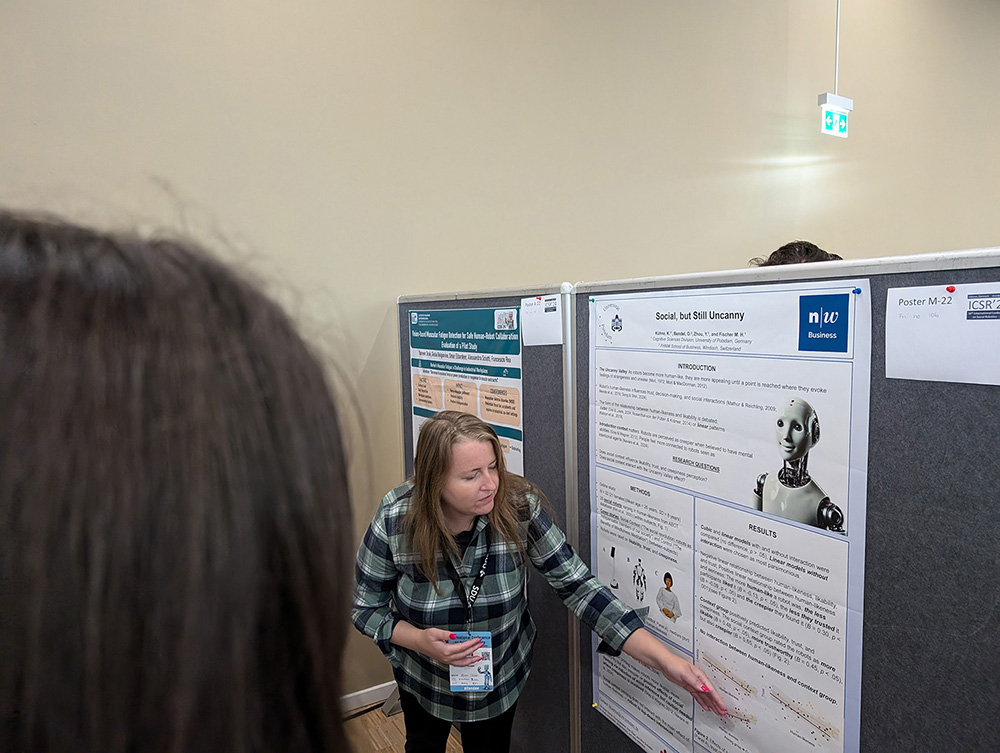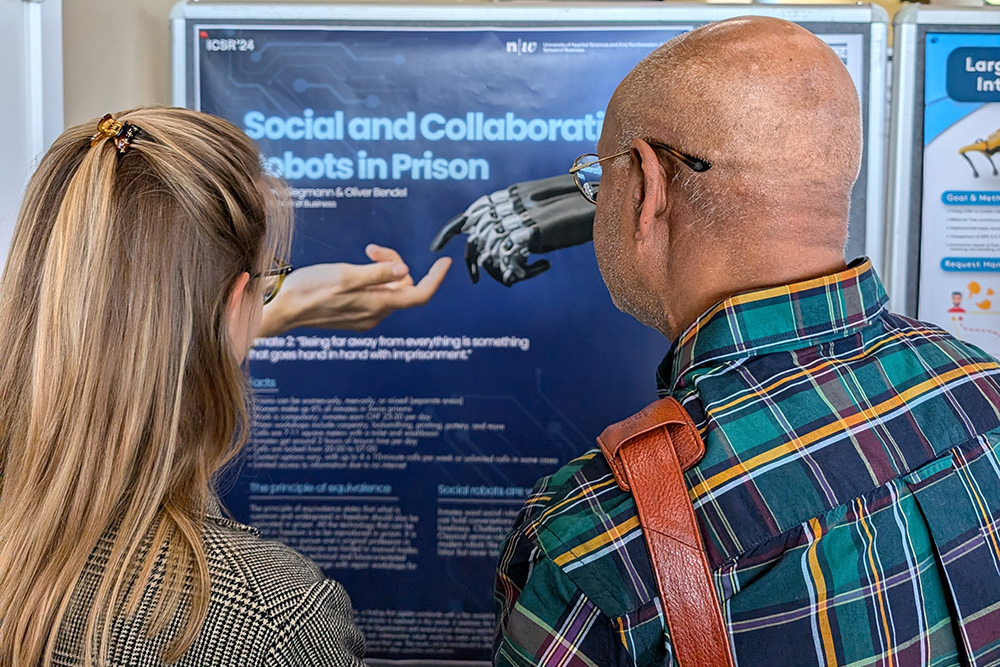The elective module “Soziale Roboter” (“Social Robots”) by Prof. Dr. Oliver Bendel will be held again from April 15 to 17, 2025 at the FHNW in Olten. It is primarily aimed at prospective information systems specialists, but prospective business economists can also take part. Dr. Amol Deshmukh has been invited as a guest speaker. He previously worked for the University of Glasgow and now conducts research at ETH Zurich. In his lecture, he will present the findings from his paper “Leveraging Social Robots to Promote Hand Hygiene: A Cross-Cultural and Socio-Economic Study of Children in Diverse School Settings”. Unitree Go2, Alpha Mini, Cozmo, Vector, Aibi, Furby and Booboo from Oliver Bendel’s private Social Robots Lab will also be on site. Social Robotics Girl, a so-called GPT who specializes in this topic, will be available as a tutor throughout the event. Basic works are “Soziale Roboter” (2021) and “300 Keywords Soziale Robotik” (2021). At the end of the elective module, students design social robots – also with the help of generative AI – that they find useful, meaningful, or simply attractive. The elective modules have been offered since 2021 and are very popular.
Special Sessions at ICSR 2025
ICSR’25 allows for special sessions on topics of particular interest to attendees. The goal is to complement the regular program with new and emerging topics of interest in social robotics. Proposals will be evaluated on a rolling basis until the deadline below, and organizers will be notified of the outcome. Once accepted, the invited session will be published on the ICRS website along with an invited session code to be used at the time of paper submission. Special session papers will go through the same review process as regular papers and will be published in the same way. Papers should be submitted as PDF documents of no more than 3-4 pages. More information is available at icsr2025.eu/ss-ws-proposal/.
Androids for Different Areas of Application
RealDollX and Realbotix have been known for years for Harmony, one of the most advanced sex robots in the world, known not least for the movie “Hi, AI”. Prof. Dr. Oliver Bendel was able to meet and talk to the robot head at a workshop in 2019. GPT was used, as explained by Kino Coursey from Realbotix, who was present and co-developed Harmony. Oliver Bendel was able to persuade him to write the article “Speaking with Harmony“, which was published in his book “Maschinenliebe” in 2020. Realbotix has since broadened its focus. The company develops social robots – mainly female androids, but also male models – for interactive presentations, among other things. Movable arms and hands are used for this. The company’s new flagship is Aria, which caused a stir at a trade fair in 2024. The movable arms and hands could also benefit Harmony, for example when hugging. Above all, however, it enables gestures that support the already convincing facial expressions. In future, the speech capabilities of the general models will be created using several speech models. Further developments will be discussed at a meeting in March 2025, for which the teams from Texas, Nevada, and California will come together in one place (Photo: Realbotix).
A New Paper on Universal Robots
The paper “The Universal Robot of the 21st Century” by Oliver Bendel was published in February 2025 in the proceedings volume “Social Robots with AI: Prospects, Risks, and Responsible Methods” … From the abstract: “Developments in several areas of computer science, robotics, and social robotics make it seem likely that a universal robot will be available in the foreseeable future. Large language models for communication, perception, and control play a central role in this. This article briefly outlines the developments in the various areas and uses them to create the overall image of the universal robot. It then discusses the associated challenges from an ethical and social science perspective. It can be said that the universal robot will bring with it new possibilities and will perhaps be one of the most powerful human tools in physical space. At the same time, numerous problems are foreseeable, individual, social, and ecological.” The proceedings volume comprises the papers presented at Robophilosophy 2024 in Aarhus. Leading philosophers, computer scientists and roboticists met there in August. Like the ICSR, the conference is one of the world’s leading conferences on social robotics (Photo: Katharina Kühne).
A Video About the ICSR 2023
ICSR is one of the leading conferences for social robotics worldwide. The 17th edition will take place from 10 to 12 September 2025 in Naples, Italy. Participants will meet for two days at the Parthenope University of Naples and for the third day at the Città della Scienza conference center. In 2023, the conference took place in Doha, Qatar. A video on YouTube by Hooman Samani provides insights into the presentations and events: www.youtube.com/watch?v=MtgM8pTPw8c … It not only shows that numerous top-class presentations take place, but also that the members of the community are highly motivated and have a lot of fun. The high level of internationality and diversity of the conference should also be emphasized. The conference website of ICSR 2025 is online since January: icsr2025.eu.
Cute little AIBI
Prof. Dr. Oliver Bendel’s privately funded Social Robots Lab has been home to little AIBI since January 2025. It comes from the Chinese company LivingAI. Other robots and figures in the Social Robots Lab are Cupboo AI Robotic Pet aka Boo Boo, Unitree Go2, Alpha Mini, Cozmo, Vector, Furby, Tamagotchi, and Hugvie. HUGGIE was dismantled at the beginning of 2025 and given to a student project in which the robot laughs with a synthetic or natural voice. NAO and Pepper visit the lab and the elective module on social robots from time to time. AIBI has various sensors, a camera, and three microphones. It understands voice commands. For more complex questions, it connects to ChatGPT. The face consists of a display in which it can show animated eyes and animated scenes of all kinds. It stands on a platform that allows it to rotate 360 degrees. It can also turn its head freely. Similar to Cozmo, it emits numerous sounds and tries to attract the user’s attention in this and other ways. Thanks to its magnets, it can be attached to the fridge and other metal surfaces, as well as to an included necklace, transforming it into a wearable. It also transforms with accessories, for example into a cat. Robot enhancement is therefore included and supplied by the company.
The ICSR 2025 Website is Now Online
The ICSR is one of the leading conferences for social robotics worldwide. The 17th edition will take place from 10 to 12 September 2025 in Naples, Italy. The conference website is now online: icsr2025.eu. “The conference theme, ‘Emotivation at the Core: Empowering Social Robots to Inspire and Connect,’ highlights the essential role of ‘Emotivation’ in social robotics. Emotivation captures the synergy between emotion and motivation, where emotions trigger and sustain motivation during interactions. In social robotics, this concept is key to building trust, fostering empathy, and supporting decision-making by enabling robots to respond sensitively to human emotions, inspiring engagement and action.” (Website ICSR) The most important conferences dates are: Full Paper Submission: March 28th, 2025; Full Paper Notification: May 9th, 2025; Camera-ready: June 30th, 2025; Paper Presentation Days at ICSR’25: September 11th and 12th, 2025. All dates are also listed on the website. Participants will meet for two days at the Parthenope University of Naples and for the third day at the Città della Scienza conference center. All buildings and rooms are also listed on the website. Be part of this excellent conference (Photo: ICSR)!
Social Robots in Olten
The elective module “Social Robots” by Prof. Dr. Oliver Bendel took place from November 4 to 6, 2024 at the Olten Campus. Tamara Siegmann (with the online presentation of the paper “Social and Collaborative Robots in Prison”) was invited as a guest speaker. She made it clear to those present that every member of the university can make a contribution to research. On site were Pepper and NAO from the FHNW Robo Labs as well as Unitree Go2, Alpha Mini, Cozmo, Furby, and Booboo (aka Boo Boo) from Oliver Bendel’s privately funded Social Robots Lab. Unitree Go2 – also called Bao (Chinese for “treasure, darling”) by the lecturer – and Booboo were particularly well received. At the end of the elective module, the students designed social robots – also with the help of generative AI – that they found useful, meaningful or simply attractive. The elective modules have been offered since 2021 and are very popular.
The Uncanny Social Robot
The uncanny valley effect is a famous hypothesis. Whether it can be influenced by context is still unclear. In an online experiment, Katharina Kühne and her co-authors Oliver Bendel, Yuefang Zue, and Martin Fischer found a negative linear relationship between a robot’s human likeness and its likeability and trustworthiness, and a positive linear relationship between a robot’s human likeness and its uncaniness. “Social context priming improved overall likability and trust of robots but did not modulate the Uncanny Valley effect.” (Abstract) Katharina Kühne outlined these conclusions in her presentation “Social, but Still Uncanny” – the title of the paper – at the International Conference on Social Robotics 2024 in Odense, Denmark. Like Yuefang Zue and Martin Fischer, she is a researcher at the University of Potsdam. Oliver Bendel teaches and researches at the FHNW School of Business. Together with Tamara Siegmann, he presented a second paper at the ICSR.
Robots in Prison
On October 22, 2024, Tamara Siegmann and Prof. Dr. Oliver Bendel (School of Business FHNW) presented their project “Robots in Prison” at the ICSR in Odense (Denmark). They investigated whether collaborative and social robots can and should be used in prisons. One result was that modern industrial robots such as cobots and classic service robots such as transportation and cleaning robots hardly create any added value. Instead, they take work away from inmates. In contrast, social robots are conceivable and useful. They bring something to imprisonment that is common in freedom. And – an important point for resocialization – they can combat the loneliness of inmates. The International Conference on Social Robotics is the most important conference for social robotics alongside Robophilosophy. The paper “Social and Collaborative Robots in Prison” will be published in a proceedings volume by Springer at the end of the year.









